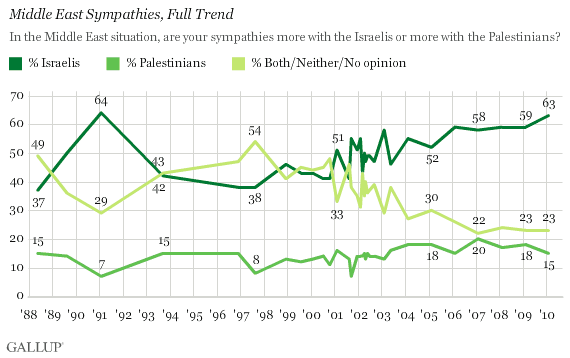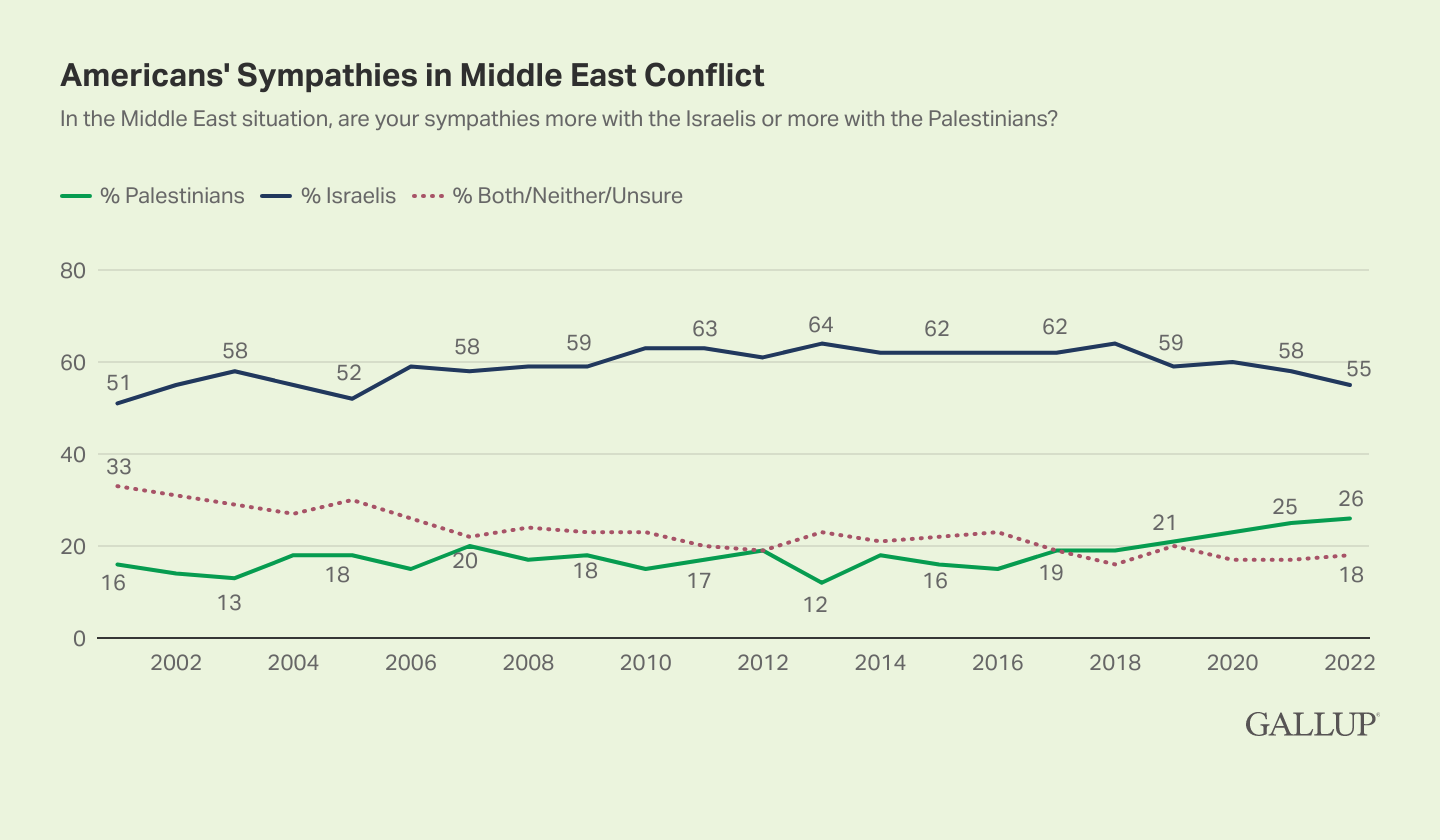Since you have a US poll in your Q, it suffices to say that antisemitism there seems to spike, at least in terms of attacks whenever there is a spike in the Israel-Palestinian conflict. And so does Islamophobia and anti-Arab sentiment for that matter.
Regarding opinions of Israel elsewhere [than the US], alas it might be hard to get comparable data it terms of granularity over time, but it appears Israel and Israelis aren't as popular in Europe:
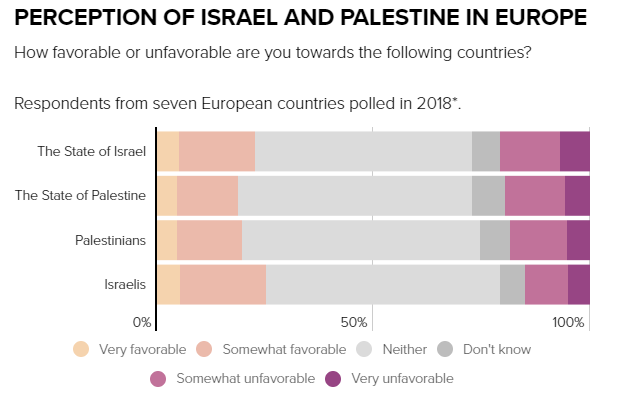
ComRes surveyed 1000 people each in Austria, France, Germany, U.K., Hungary, Poland and Sweden in September 2018.
A rather similar result from May 2023, which also has the US for comparison:
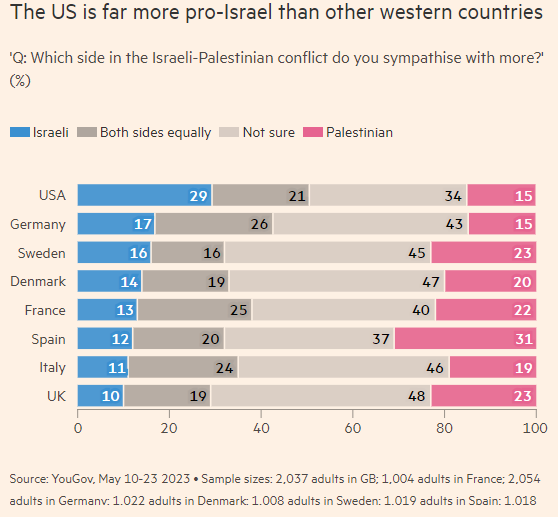
One also has to keep in mind that results on such questions can differ substantially in a "versus" Q like that, compared to simple sympathy for one country. Alas, I was not able to find poll questions of the latter kind in Europe (like Gallup does in the US), but since your Q is about the Israel-Palestinian conflict, this kind of "versus" poll questions are relevant enough.
Anyhow, a more interesting point (or rather data series) is that Democrats' sympathies [in the US] had shifted against Israel, till March 2023 or so:
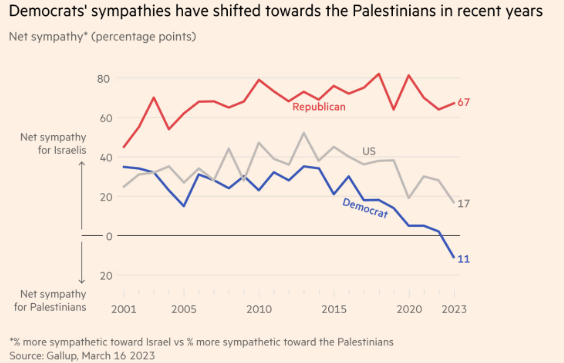
I personally would not jump to conclusions as to what caused that shift in [US] Democratic party voters wrt Israel vs Palestinians.
(Source for the last two graphs is FT.)
Tracking down that Gallup poll the only other obvious factor/correlate is that younger Americans were less in favor of Israel, compared to older ones. There's no attempt there to infer other causes. If you read however the US right-wing media, like Fox News, theories as to what caused that drift abound: TikTok, wokeism, campus education or diversity policies etc. How much of that can be definitely inferred as a cause (or mediating factor) YMMV. I've yet to see some convincing studies on that. Anyhow, that opinion is fairly shared in some European corners. For example, French Senator Nathalie Delattre likewise blamed TikTok for spreading antirentism in combination with Islamic radicalization. Hungarian researchers led by Kalman Szalai likewise claim (same source) that there have been much fewer antisemitic events in Hungary ("40 to 50") compared to Germany ("more than 2,000") in 2021. It's not said there explicitly, but there's the allusion that Hungary having had very limited acceptance of Muslim refugees/immigrants (unlike Western Europe) thus managed to avoid antisemitism problems seen elsewhere in Europe. (That research IMHO should have at least normalized the figures relative to population, but on quick napkin calculation, their claim still holds even after doing the latter, assuming the figures don't have other sources of bias like e.g. underreporting in some areas due to unaccounted for factors.) Anyhow "European Muslim Antisemitism" has received more extensive treatments. A review of this book in the in the Israel Journal of Foreign Affairs notes that when it came to "antisemitic violence or threats" in Europe "the largest group of perpetrators was Muslim". It further mentions that there are multiple sources of this including "antisemitism related to Israel, based on the conflation of Jews and Israelis and driven by a Manichean view of the Israeli–Palestinian conflict".
As for rise of the right in Europe in the past decade, a research paper from about 10 years ago claimed it was much more connected to rising Islamophobia than to antisemitism. But that was based only on analyzing the platforms of some such parties rather than opinion polls. Anyhow, causally relating that rise to any events in Israel rather than to refugees from Syria is probably rather more tenuous, given the relative impact of those events of people living in Europe. The point that "Migration from Muslim regions [is] causing anti-Semitism to rise in the EU" is also raised by some of these parties, e.g. by AfD MEP Nicolaus Fest.
As for whom caused the 2-state solution to fail, I'm not really delving into that one. Clearly a good number of Israel's supporters like to blame the Palestinians (exclusively), and vice-versa the supporters of Palestine mainly blame Israel and the US. As for the claims in the comments that Netanyahu backed the peace process, his critics counter-claim that he only did so declaratively, but not in paratactical terms. This goes back as far as his first election as PM (which was not in 2009); for instance, a 1998 article about Netanyahu's stint as PM then charges "an uninterrupted Likud-led derailment of the peace process". You may or may not agree with that, but his critics don't simply claim he started doing this in 2009.
FWTW, some critics of later Netanyahu policies say that while he verbally criticized Sharon's unilateral disengagement plan (working around the PA rather than with it) he essentially embraced that way of separation in the aftermath. Netanyahu has even been called the "ultimate status quo politician" (in that regard) that eventually "it’s blown up in our faces" (on Oct 7). And even more recent criticism of him argues that he wants a Gaza without PA even after Hamas is gone, so without any two-state prospect. (Some commentators called the latter move a "political grenade" thrown at the present US approach to the Middle East.) So, while some critics did argue Netanyahu was in some ways more extreme and even that "the two-state solution died on Netanyahu’s watch", and some even quote him saying "I actually stopped the Oslo accords" (seemingly in 2001), other critics of him argue that his way of doing business with the Palestinians is essentially more of the same Israeli/Likud policies since 2005 at least, and possibly even since 1996.
Finally, if you wonder why I didn't make a strong distinction between antisemitism and anti-Israel sentiment in such a discussion, the reason is that when it comes to correlations, to quote the title of a 2005 paper:
Anti-Israel Sentiment Predicts Anti-Semitism in Europe.
As for some other parts of the world, according to an article in the Fathom Journal...
antisemitic attitudes among European Muslims are no outlier in the wider Islamic World. Rather, they echo the popular opinion of the countries most European Muslims or their ancestors immigrated from. Thus, Anti-Defamation League (ADL) surveys conducted in 2014 and 2015 found the Middle East and North Africa to be the most antisemitic region in the world. [...] Gaza topped the list with 93 per cent antisemites.
There's also some cause-effect commentary on that like
“It is clear in this survey that the conflict in the Middle East matters,” Foxman said during a Tuesday press conference debuting the data. “But it is not clear from the survey whether it is the cause or the excuse for anti-Semitism.”
So, given that, it's probalby hard to devise how one could measure in Gaza changes in anti-Israeli sentiment (broadly constred) indepdently of [changes in] antisemitism. Anyhow, that Fathom piece also notes:
Explanations, which focus on the failings of European societies to integrate Muslim immigrants are therefore wrongheaded. Rather, European societies might be credited with keeping the rate of Muslim antisemitism at lower levels compared to the Middle East and North Africa, despite the fact that it remains intolerably high.
Now some measures of the Natanyahu goverments did elicit some diplomatic protests, e.g. Stratfor writes:
Jun 28, 2023 [...]
The governments of Saudi Arabia, the United Arab Emirates, Bahrain and Jordan have condemned the policies of Israel's far-right government with increasing frequency in recent months, including Israeli military operations like the Gaza war in May, the storming of the al-Aqsa Mosque in April, and the recent violence in Jenin in June. This suggests that officials in these states have become more critical of Israeli behavior.
How much of this direclty influences the average person on the [Arab] street is pretty difficult to say, but there are some polls like
According to a 2022 survey by the Washington Institute for Near East Policy, support for the Abraham Accords fell in the United Arab Emirates to 25% from 47% from 2020 to 2022. Bahrain also saw a large drop: 20% of the population supports the deal, down from 45% in 2020.
Again though, IMHO it's a little difficult to be sure of cause and effect. The Netanyahu–Gantz government government was in power May 2020 - June 2021. But was it all that different from a Likud government in policies vis-à-vis of Palestinians? Or was even the Bennett–Lapid government (June 2021 - December 2022) able to change much in that respect?
ToI commented a bit differently on the possible causes:
In the UAE, support fell from 47% to 25% in the last two years. In Bahrain, just 20% of the population supports the deal, down from 45% in 2020. In that time, Israel and terrorists in Gaza fought a devastating war and violence in the West Bank surged to its highest levels in years.
